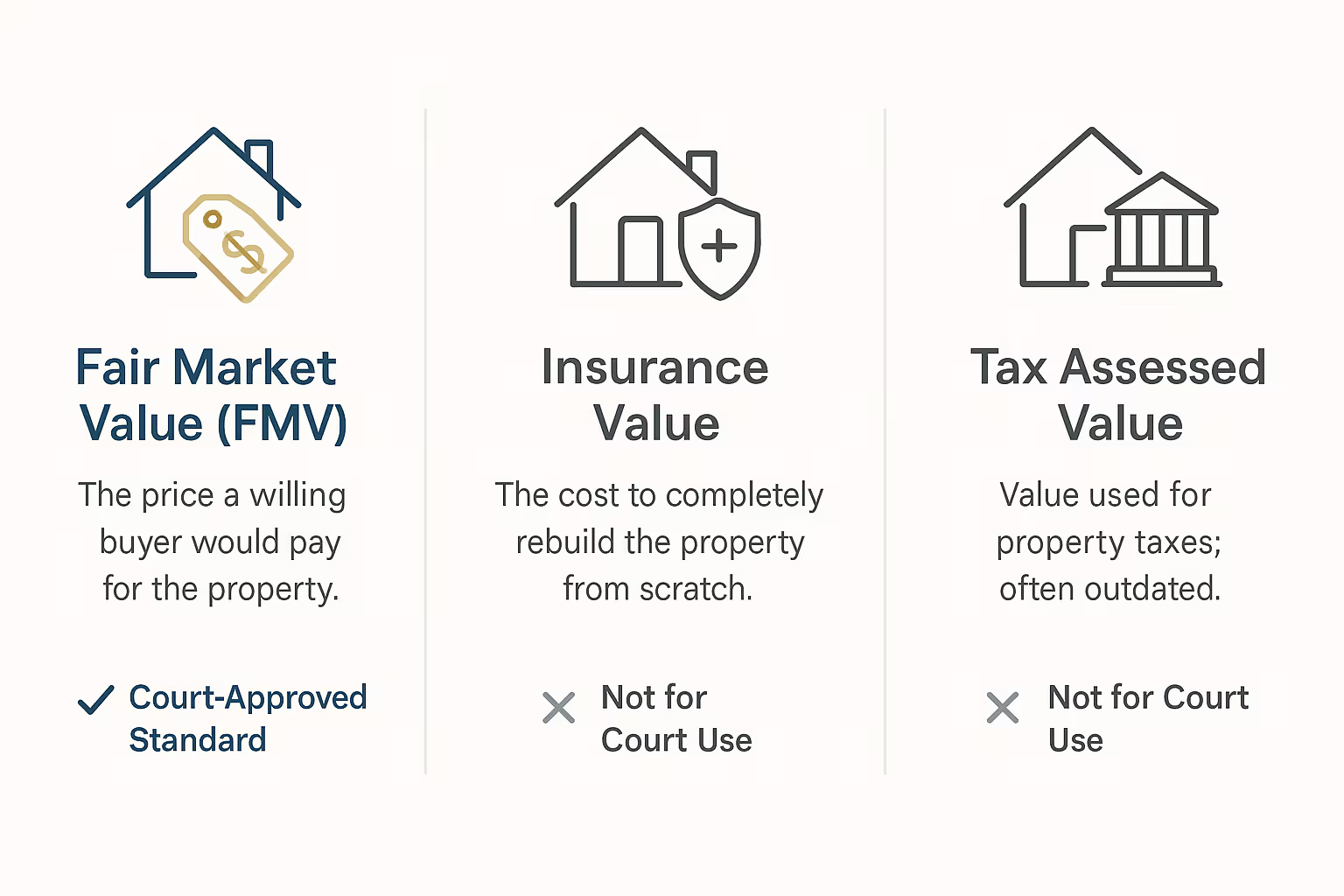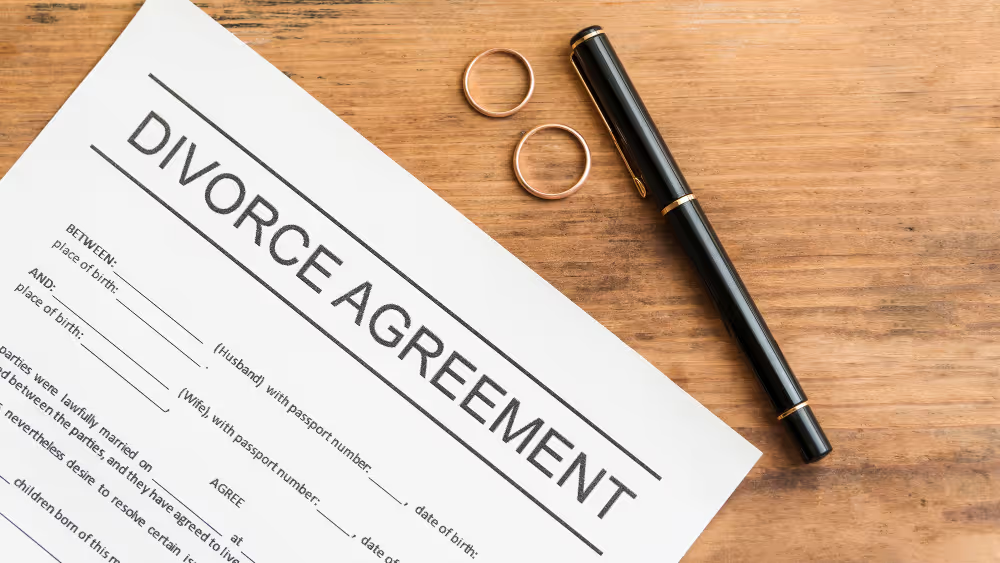






Imagine walking into divorce mediation only to discover your home appraisal won’t hold up in court. The mediator explains that your online estimate is inadmissible, your insurance appraisal uses the wrong valuation method, and you now face delays and added legal fees to start over.
This scenario is a frustrating reality for many, derailing cases and leading to unfair settlements.
A professional divorce appraisal provides the objective, legally defensible foundation that courts require for equitable property division. It removes emotional bias and establishes a trustworthy value for one of your most significant assets. The right appraiser can streamline your divorce, while the wrong one can drain your finances and compromise your case. For any property type, a certified, USPAP-compliant appraisal is necessary for a fair settlement. Learn more about divorce appraisals here.
This guide will walk you through finding a qualified appraiser who understands the specific demands of divorce proceedings, ensuring your financial interests are protected.

In divorce proceedings, the court requires a specific type of valuation: Fair Market Value (FMV). The IRS defines FMV as “the price at which property would change hands between a willing buyer and a willing seller, neither being under any compulsion to buy or sell, and both having reasonable knowledge of relevant facts.” You can learn more about appraisal standards and topics on our blog. This standard is also used for assessing the value of land in divorce cases.
Key Term: Fair Market Value (FMV)This is the only valuation standard courts accept for divorce. It reflects the realistic selling price of an asset, not its insurance replacement cost or tax-assessed value.
This is a critical distinction. An insurance appraisal calculates replacement cost, which is often much higher than what a property would sell for. A tax assessment may be years out of date, and online estimates lack the detailed analysis required for legal proceedings.
Furthermore, divorce appraisals are often retrospective. This means they must establish the property’s value as of a specific legal date in the past, such as the date of separation or filing, which requires an appraiser with expertise in historical market data.
For example, if you separated in January 2023 but your divorce isn’t finalized until 2025, the court needs to know the home’s value from 2023, not its current worth.
In most divorces, both spouses share the cost of an appraisal, typically in a 50/50 split. Courts view this as a necessary tool that benefits both parties by providing an objective valuation.
The cost varies by asset. A home appraisal for a standard residential property typically costs between $400 and $800, though complex or high-value homes can range from $500 to $2,000.
Business valuations are a more significant investment, often ranging from $5,000 to $15,000 or more. Personal property appraisals also vary widely, from a few hundred dollars for a single item to several thousand for an entire household’s contents.
If spouses cannot agree on a neutral appraiser, each may hire their own expert, effectively doubling the cost. This may be necessary when there is significant distrust or disagreement.
While these fees can seem high, they are a small price to pay compared to the financial losses from an inaccurate or rejected valuation.
Most divorces involve a variety of assets, each requiring an appraiser with specific credentials and expertise.
For your primary residence, vacation homes, or investment properties, you will need a Real Estate Appraiser. These professionals must be state-licensed and adhere to the Uniform Standards of Professional Appraisal Practice (USPAP). A certified real estate appraisal is crucial for residential property division in divorce cases.
A Certified Residential Appraiser can handle all residential properties, while a Certified General Appraiser can value complex commercial assets. For complex holdings, like a commercial property, a specialized valuation is required to ensure fairness in the settlement. Ensure your commercial real estate valuation is certified and USPAP-compliant. Look for designations like SRA (Senior Residential Appraiser) as a sign of advanced experience.
If you own a business or professional practice, a Business Valuation Specialist is essential. This valuation must also be certified and USPAP-compliant for use in court. You should look for professionals with credentials like ASA (Accredited Senior Appraiser), ABV (Accredited in Business Valuation), or CVA (Certified Valuation Analyst).
For tangible assets like fine art, antiques, and jewelry, you’ll need a Personal Property Appraiser. Their credentials should come from respected organizations like the American Society of Appraisers (ASA) or the International Society of Appraisers (ISA).
Valuing specific items often requires niche expertise. For instance, jewelry should be evaluated by a certified gemologist (GIA), while a wine collection requires a specialist with knowledge of that specific market.

Your divorce attorney is the best place to start. Experienced family lawyers maintain a network of trusted appraisers whose work they know will stand up in court. You can also search the online directories of professional organizations or browse our other articles for more tips.
Pro Tip: Start with Your Attorney. Your divorce lawyer is your best source for referrals. They can recommend qualified, court-tested appraisers they have worked with and trust to produce legally defensible reports.
When interviewing a potential appraiser, ask targeted questions. Inquire about their specific experience with divorce cases, expert witness testimony, and retrospective valuations.
A qualified professional will answer these questions confidently and should be able to provide references from family law attorneys.
Finally, be wary of red flags. An unwillingness to provide a license number, promises of a specific value upfront, or unusually low fees are all signs of an unqualified appraiser.
Avoiding a few common pitfalls can save you thousands of dollars in delays and unfair settlements.
The most frequent mistake is using the wrong type of valuation. Courts require a Fair Market Value appraisal and will reject online estimates, tax assessments, or insurance valuations.
Warning: A Costly Mistake to Avoid. Do not rely on online estimates, tax assessments, or insurance appraisals for court. They are not compliant with legal standards and will be rejected, forcing you to start over and pay for a new appraisal.
Another costly gamble is hiring an unqualified or inexperienced appraiser. Their report will likely be challenged and rejected, undermining your entire case.
You should also be sure to provide complete and accurate documentation to avoid delays. Finally, try to agree on a single, neutral appraiser to avoid duplicating costs and fueling unnecessary conflict.
Question: Can we use the same appraiser for multiple properties?
Answer: Yes, and it’s often more cost-effective. A Certified General Appraiser can handle various real estate types, and a personal property generalist can evaluate diverse household contents. Using one professional ensures consistency across all your valuations.
Question: What happens if we disagree with the appraisal results?
Answer: First, you should ask the appraiser for a detailed explanation of their methodology to understand how they arrived at the value. If you still believe there is an error, your attorney can help you determine the best course of action. You also have the option to hire a second appraiser for another opinion, though this will add to your overall costs.
Question: How long is a divorce appraisal valid?
Answer: Most courts accept appraisals that are 6-12 months old. However, in a rapidly changing market, a more recent valuation may be required to reflect current conditions accurately. Your attorney can advise you on the specific timing requirements for your jurisdiction.
A professional divorce appraisal is an investment in a fair and equitable settlement. It provides the confidence that your property division is based on true market realities, not guesswork or emotional attachments.
By planning ahead and hiring a qualified, neutral professional, you can protect your assets and navigate this challenging process with clarity.
Ready to ensure a fair and accurate valuation for your divorce? Request an appraisal from the experts at Appraise It Now. Our nationwide network of credentialed appraisers specializes in divorce cases and delivers legally defensible reports you can trust. If you have more questions, don’t hesitate to contact us today.




